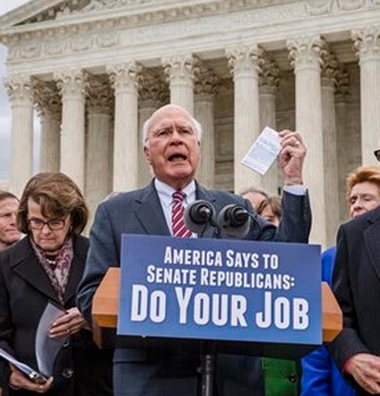In court fight, Democrats pressure Republicans at home

Washington (AP) — Searching for a way to put a new justice on the nation's highest court, President Barack Obama is hoping that all politics really is local — even Supreme Court politics.
The president and his allies are pressuring Republican senators back home, aiming to make life politically uncomfortable for the lawmakers who've vowed that only Obama's successor will fill the seat of the late Antonin Scalia.
It's a long shot. Only a few Republicans have expressed openness to even hold hearings on a nominee. Obama must first get Republicans to break from leadership on that and then win confirmation support from 14 GOP senators.
The president is still trying to make his case. The White House said Thursday Obama will meet next week with Senate Republican leader Mitch McConnell, Democratic leader Harry Reid, Judiciary Committee Chairman Chuck Grassley and Patrick Leahy, the committee's top Democrat. Meanwhile, Obama has talked to at least two senators directly at the White House.
The president spoke briefly Wednesday with Orrin Hatch of Utah, a former Judiciary Committee chairman viewed as potentially sympathetic to concerns about the precedent set by the Republican opposition.
Hatch said Thursday he wasn't swayed, though "I listened very carefully."
Obama spoke to Sen. Lamar Alexander of Tennessee about the nomination search on Thursday, after an event at the White House, according to a White House official, who would not be named discussing private conversations.
The White House and its allies believe the real work is on the ground in places like Ohio, Wisconsin and New Hampshire — states where Republican senators face tough re-election campaigns — as well as Nevada, Pennsylvania and Florida, where independent voters often hold sway.
In some states, incumbent Republicans are worried about challenges from even more conservative candidates, but Democrats hope GOP opposition to a confirmation vote will become untenable once the primary gives way to the general election.
That's why People for the American Way and other advocates announced plans to protest Monday outside Sen. Kelly Ayotte's Manchester, New Hampshire, office. Last week, the group asked actor Martin Sheen to record robocalls in Wisconsin urging Sen. Ron Johnson to "put his constitutional duties first."
Meanwhile, the Democratic Senatorial Campaign Committee, an arm of Obama's party, has targeted Republicans in Wisconsin, New Hampshire, North Carolina, Nevada and Florida for opposing consideration of Obama's nominee. The Senate Majority PAC, a super PAC working to elect Senate Democrats, is attacking Sens. Rob Portman of Ohio, Pat Toomey of Pennsylvania, Johnson and others as part of a $1.5 million ad campaign.
The effort has been aided by the editorial pages of local newspapers, still an influential force in statewide elections. In Pennsylvania, the Scranton Times-Tribune's editorial page wrote that "Toomey should desist" from what it called GOP "defiance of the public will." And the Quad-City Times in Iowa accused Grassley on Thursday of having "gripped the grenade he's clutching and pulled the pin."
"It's only a matter of time before, one way or another, it blows up in the GOP's collective face," the paper's editorial board wrote.
The Democrats' efforts aren't always direct. Sen. Harry Reid of Nevada publicly talked up his home state governor, Republican Brian Sandoval, as a possible nominee. The notion was quickly condemned by the Democratic base, but it also put the pressure on Dean Heller, who was appointed to the Senate by Sandoval.
By Thursday, the governor ended the chatter when he announced he was honored, but not interested.
Obama's nominee will almost certainly come with some new cudgel in a go-local push. Among the judges floated as a possibility is Jane Kelly, a former public defender in Iowa who once clerked for a longtime Grassley backer. A Cuban-American — such as Judge Adalberto Jordan of the 11th Circuit Court of Appeals — could put Sen. Marco Rubio in a tough spot with Florida's Cuban community. An African-American could add pressure in Pennsylvania, Ohio and Illinois.
Regardless of personal profile, the president is expected to pick a nominee with some bipartisan credentials — such as clerking for a Republican judge or working in a GOP administration. Such a move, Democrats argue, would expose Republican objections as political rather than merit-based.
Republicans maintain it's about the principle of the president nominating in an election year.
Sen. Richard Burr, R-N.C., up for re-election this year, said there could be a Republican in the White House and he still wouldn't support holding confirmation hearings in an election year. Nor would he meet with a nominee.
"No need to because there is not going to be a hearing on anybody. That's it. Period. Done," Burr said.
Moving senators away from that hard line would likely take a groundswell of public pressure. There are few signs yet of that happening.
A series of national surveys show Americans are roughly split about whether Obama should pick the next justice.
Republicans say they've only just begun making their case to the public.
"I don't think this is the silver bullet Chuck Schumer and Harry Reid think it is," Sen. Roger Wicker, R-Miss., head of the GOP's Senate campaign organization, said of Democratic leaders in the Senate.
By Kathleen Hennessey and Josh Lederman, Associated Press. Copyright 2016 The Associated Press. All rights reserved. This material may not be published, broadcast, rewritten or redistributed.
The Gayly – February 26, 2016 @ 9:50 a.m.





